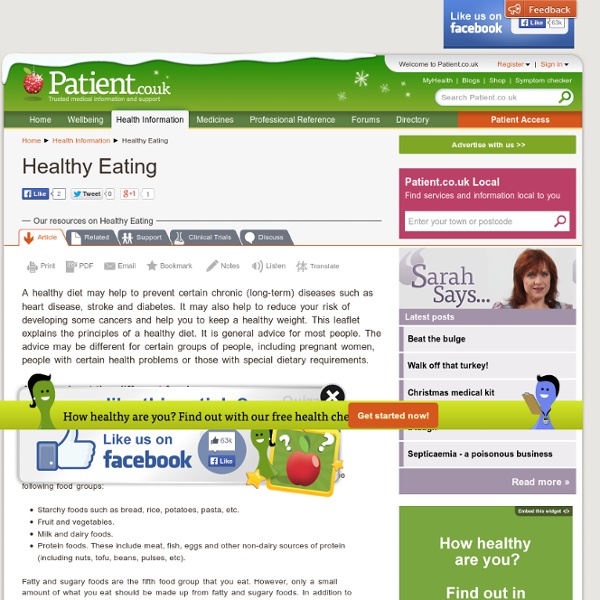Easy Tips for Planning a Healthy Diet & Sticking to It
Healthy eating tip 1: Set yourself up for success To set yourself up for success, think about planning a healthy diet as a number of small, manageable steps rather than one big drastic change. If you approach the changes gradually and with commitment, you will have a healthy diet sooner than you think. Simplify. Instead of being overly concerned with counting calories or measuring portion sizes, think of your diet in terms of color, variety, and freshness. Think of water and exercise as food groups in your diet. Water. Exercise. Healthy eating tip 2: Moderation is key People often think of healthy eating as an all or nothing proposition, but a key foundation for any healthy diet is moderation. For most of us, moderation or balance means eating less than we do now. Try not to think of certain foods as “off-limits.” Healthy eating tip 3: It's not just what you eat, it's how you eat Healthy eating is about more than the food on your plate—it is also about how you think about food. Greens.
Healthy eating - recipes
Eating healthily can be hard when you've got a family to feed on a budget but goodtoknow is here to show you how to make healthy meals - without it costing the earth. Our healthy recipes section has hundreds of different recipes, so we can guarantee you will find something delicious to feed your family. If you want to make sure you stick to your healthy eating plan (this time!) we have some easy things you can do to make it a little bit easier: Don't forget breakfast! Plan your food At the start of the week/month, take a little time out to sit down and plan exactly what you're going to eat. Pick what suits you There are loads of different diets out there but they may not suit you or your situation. Keep full You can have the best intentions, but if you're hungry - you're going to snack. Know your food Understanding your food and knowing how to use different ingredients will give you much more scope to create healthy meals. Homemade not shop-bought
Health: Nutrition
18 June 2014Last updated at 16:26 The human body needs a balanced diet to deliver vital nutrients What's your idea of a perfect meal? Cutting through the myriad of diet plans and faddish eating regimes, the human body needs a balanced, healthy eating plan to keep functioning properly. Grow and build Repair and heal Reproduce successfully Repel illnesses and infections Avoid weight-related health problems Eating a variety of foods can also reduce the risk of getting conditions including heart disease, stroke, some cancers, diabetes and osteoporosis. The foods we need to eat can be divided into five separate groups. The reason we need a diet drawn from all of the groups is that they all deliver different, but vital, nutritional benefits to our bodies. Fruit and vegetables are one of our main sources of vitamins and minerals, which the body needs to perform a variety of functions well. Starchy foods, also known as carbohydrates, are where we get most of our energy from.
Le bien manger - Qu'est ce qu'une allégation - Comprendre les allégations nutritionnelles et de santé
Les consommateurs qui arpentent les rayons des grandes surfaces alimentaires, ne peuvent que remarquer la quantité croissante de produits arborant des allégations de santé, des slogans et des textes publicitaires qui revendiquent des effets bénéfiques sur la santé. Et les consommateurs sont sensibles à ces allégations santé car ils ont pris conscience que le mode de vie actuel (sédentarité, nourriture trop riche, stress...) a un effet négatif sur leur santé. Comme la santé est devenue un des principaux arguments de vente des produits alimentaires et que les références à la santé se multiplient, le consommateur se retrouve difficilement dans cette profusion de pseudo informations. Les ajouts de vitamines, la présence d'Oméga 3 ou encore l'allègement en matières grasses, ... présentent-ils un intérêt pour les consommateurs? Les résultats, présentés dans ce guide d'achat incitent à la prudence.



